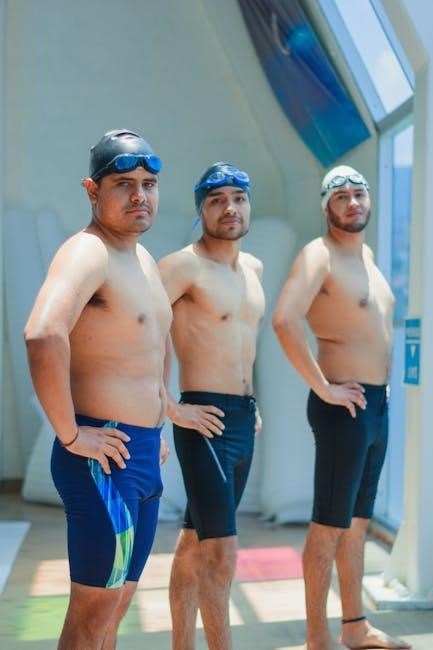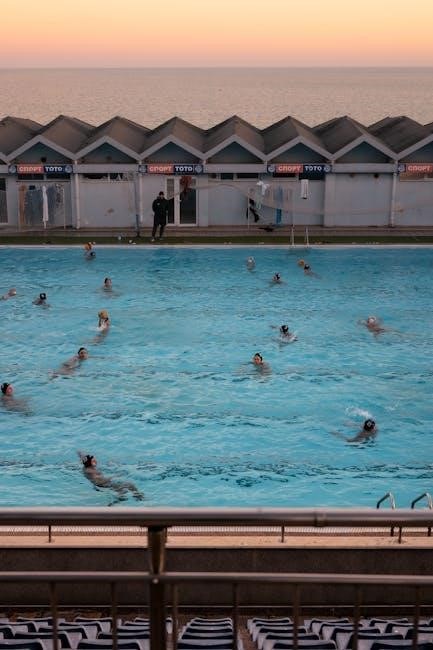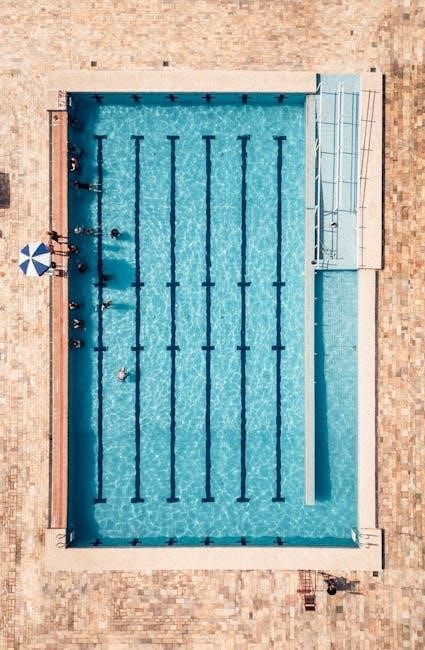A well-structured diet is essential for swimmers to fuel performance, recover effectively, and maintain hydration. It provides the necessary energy, supports muscle repair, and balances carbs, protein, and fats.
Why Nutrition Matters for Competitive Swimmers
Nutrition is crucial for competitive swimmers as it directly impacts energy levels, recovery, and overall performance. A balanced diet ensures proper fueling for intense training, aids in muscle repair, and supports hydration. It optimizes endurance, strength, and speed, making it a cornerstone of achieving peak performance in the water and maintaining overall health and competitiveness throughout the season.

Key Nutritional Components for Swimmers
A balanced diet rich in carbohydrates, proteins, and healthy fats is vital for swimmers to fuel performance, aid recovery, and maintain optimal energy levels during training and competition.
Carbohydrates: The Primary Energy Source
Carbohydrates are swimmers’ main energy source, fueling workouts and recovery. Daily intake should be 3-8g/kg, depending on training intensity. Focus on complex carbs like whole grains, fruits, and vegetables for sustained energy. Simple carbs, such as bananas or energy bars, are ideal pre- or post-workout for quick fuel. Proper timing ensures optimal performance and prevents fatigue during training sessions.
- Complex carbs for sustained energy
- Simple carbs for quick fuel
- Timing is crucial for performance
Proteins: Essential for Muscle Repair and Growth
Proteins are vital for muscle repair and growth, especially after intense swimming sessions. Swimmers need 1.2-2.2g/kg of protein daily from sources like lean meats, fish, eggs, dairy, and plant-based options. Adequate protein intake supports muscle recovery, reduces injury risk, and promotes overall performance. Timing protein intake around workouts can enhance recovery and muscle synthesis, ensuring optimal results.
- 1.2-2.2g/kg daily intake recommended
- Supports muscle repair and recovery
- Includes lean meats, fish, and plant-based options
Fats: The Importance of Healthy Fatty Acids
Fats are essential for hormone production, inflammation reduction, and absorption of fat-soluble vitamins. Swimmers benefit from healthy fats like omega-3, omega-6, and monounsaturated fats. Sources include nuts, avocados, and fatty fish. While fats are crucial, overconsumption can lead to excess calories. Balancing fats with carbs and proteins ensures optimal energy and recovery without compromising performance.
- Essential for hormone production
- Supports inflammation reduction
- Includes omega-3, omega-6, and monounsaturated fats
- Found in nuts, avocados, and fatty fish
Daily Dietary Needs
Competitive swimmers require a balanced daily intake of carbohydrates, proteins, and fats, tailored to their training needs, ensuring proper hydration and adjusting calories based on intensity.
Pre-Training Meals
Swimmers should consume pre-training meals 2-3 hours before practice, focusing on high-carbohydrate foods like whole grains, fruits, and lean proteins. Examples include oatmeal with banana, eggs with toast, or yogurt with berries. These meals provide sustained energy, prevent hunger, and support performance. Proper hydration is also crucial to avoid digestive discomfort during training.
Post-Training Recovery Nutrition
After training, swimmers should consume a mix of carbohydrates and protein within 30-60 minutes to replenish energy stores and support muscle recovery. Ideal options include bananas with peanut butter, protein smoothies, or energy bars. Staying hydrated with water or sports drinks is also crucial to restore fluid balance and aid digestion for optimal recovery and performance.
Competition Day Nutrition
On competition day, swimmers should focus on light, easily digestible meals rich in carbohydrates and hydration. Opt for foods like bananas, energy bars, or toast 1-3 hours before events. Avoid heavy or high-fat meals to prevent discomfort. Replenish fluids with water or sports drinks to maintain energy levels and peak performance throughout the competition.

Hydration Strategies
Hydration is crucial for swimmers, as water loss can hinder performance. Monitor fluid intake, drink water regularly, and adjust based on training intensity and environmental conditions to stay optimal.
Importance of Staying Hydrated
Proper hydration is vital for swimmers, as it directly impacts physical performance and recovery. Even mild dehydration can reduce endurance, stroke efficiency, and focus. Water aids muscle function, regulates body temperature, and prevents cramps or fatigue, ensuring optimal performance in both training and competitions. Staying hydrated is essential for maintaining energy levels and overall health.
Signs of Dehydration
Swimmers should monitor for dehydration signs, including dry mouth, dizziness, fatigue, and decreased performance. Other indicators are dark urine, headaches, and muscle cramps. Severe dehydration can lead to nausea and fainting. Recognizing these signs early is crucial to prevent performance impairment and health risks, ensuring proper hydration levels are maintained during training and competitions.
Hydration Tips for Swimmers
Swimmers should drink water regularly before, during, and after training. Aim for 17-20 ounces of fluid 2-3 hours pre-practice and 7-10 ounces every 10-15 minutes during workouts. Avoid sugary drinks and opt for water or electrolyte-rich beverages. Monitoring urine color, aiming for pale yellow, helps ensure hydration levels are optimal for performance and recovery.
Meal Planning and Timing
Proper meal planning and timing are crucial for swimmers’ performance, ensuring balanced meals with carbs, proteins, and fats 1-3 hours before training, and within 30 minutes post-session for recovery.
Structuring Meals for Optimal Performance
A balanced intake of carbohydrates, proteins, and fats is vital for swimmers, with meals timed 1-3 hours before training and within 30 minutes post-session. Proper hydration and calorie intake, adjusted to training intensity, ensure sustained energy and recovery.
The Role of Snacks in a Swimmer’s Diet
Snacks play a crucial role in maintaining energy levels between meals. Swimmers should opt for high-carbohydrate, low-protein snacks like fruits, energy bars, or yogurt 30 minutes to 1 hour before training and within 30 minutes post-session for recovery. Properly timed snacks help fuel performance and support muscle recovery without causing digestion discomfort during intense workouts. Staying hydrated with water or sports drinks is also essential.
Sample Meal Plans for Swimmers
A typical day for swimmers includes meals rich in carbs, protein, and healthy fats. Breakfast might feature oatmeal with fruits and nuts. Lunch could include grilled chicken, quinoa, and vegetables. Dinner often consists of fish, sweet potatoes, and steamed greens. Snacks like bananas or yogurt are ideal for quick energy. Staying hydrated with water and electrolyte-rich drinks is emphasized throughout the day to maintain performance levels and recovery efficiency.
Supplements in a Swimmer’s Diet
Supplements can enhance a swimmer’s diet by providing essential nutrients like protein, iron, and calcium. They support energy levels, recovery, and overall performance without replacing a balanced diet.
Role of Supplements
Supplements play a crucial role in filling nutritional gaps, supporting energy levels, and aiding recovery. They provide essential nutrients like protein, iron, and calcium, optimizing performance and reducing fatigue. However, they should not replace a balanced diet but rather complement it, ensuring swimmers meet their nutritional needs for intense training and competition.
Common Supplements for Swimmers
Common supplements for swimmers include protein powder, omega-3 fatty acids, iron, and electrolytes. These help with muscle recovery, joint health, energy production, and hydration. Protein powder supports muscle repair, while electrolytes replenish lost salts during intense workouts, preventing cramps and fatigue, ensuring optimal performance in the water.
When to Consider Supplements
Supplements should be considered when dietary needs exceed what food alone can provide, such as during intense training, high-calorie deficits, or specific deficiencies. They are beneficial for muscle recovery, energy boosts, and hydration. Timing is crucial, with pre- and post-workout options like protein shakes or electrolytes aiding performance and recovery, ensuring swimmers meet their nutritional goals effectively.

FAQs and Common Queries
Common questions include optimal calorie intake, protein requirements, meal timing, and hydration strategies. Swimmers often seek advice on balancing nutrition for performance, recovery, and overall health.
Weight Management for Swimmers
Weight management is crucial for swimmers to maintain optimal performance and health. Balancing calorie intake with energy expenditure ensures proper fueling for training while avoiding unnecessary weight gain. Swimmers should focus on nutrient-dense foods, monitor portion sizes, and stay hydrated to support metabolic needs. A tailored diet plan helps achieve and maintain a healthy weight, enhancing both power and endurance in the water.
How Often Should Swimmers Eat?
Competitive swimmers should eat 5-6 smaller, balanced meals throughout the day to meet high energy demands. This includes a pre-training meal rich in carbs, a post-training recovery meal with protein, and snacks in between. Staying fueled ensures optimal performance and recovery, with meal frequency adjusted based on individual training intensity and calorie needs.
Best Foods for Competitive Swimmers
Whole grains, lean proteins, and healthy fats are essential. Include complex carbs like oats, brown rice, and whole-grain pasta for sustained energy. Opt for lean meats, fish, eggs, and plant-based proteins like beans and tofu. Incorporate fruits, vegetables, nuts, and seeds for vitamins and minerals. Hydrate with water, coconut water, or sports drinks to replenish electrolytes. Snacks like bananas, smoothies, or energy bars provide quick fuel.
Monitoring and Adjusting the Diet Plan
Regularly track energy levels, performance, and recovery to ensure the diet meets needs. Adjust macronutrient ratios and meal timing based on training intensity and progress.
Tracking Progress and Adjustments
Monitor performance metrics like speed, endurance, and recovery to assess diet effectiveness. Adjust macronutrient ratios, portion sizes, and meal timing based on progress; Regularly track energy levels and recovery quality, ensuring the diet aligns with training demands. Work with a sports dietitian to refine the plan and address any nutritional gaps or performance plateaus.
Working with a Sports Dietitian
A sports dietitian tailors a swimmer’s diet to meet specific needs, optimizing performance and recovery. They analyze training intensity, body composition, and health goals to create personalized plans. Regular consultations ensure the diet evolves with the swimmer’s progress, addressing any nutritional deficiencies and enhancing overall athletic performance effectively;
Continuous Adaptation of the Diet Plan
Swimmers’ dietary needs evolve with training intensity, competition phases, and recovery demands. Regular adjustments ensure optimal fueling, hydration, and nutrient balance. Caloric intake and macronutrient ratios may shift based on performance goals, weight management, and physical changes, ensuring the plan remains tailored to individual needs for peak performance and overall health.
